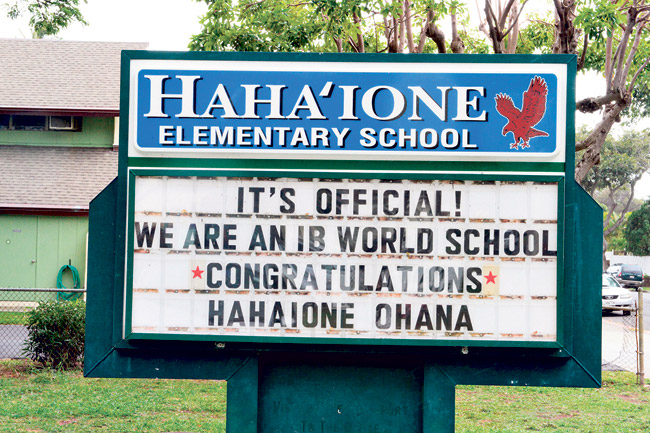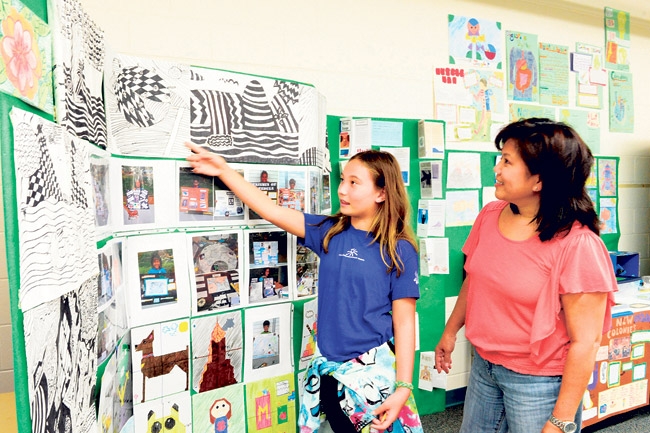A Model Of Transformative Learning
Hahaione Elementary School, the state’s newest authorized International Baccalaureate World School, is training global citizens
Class will come to order. Today’s lesson is global citizenship.
Have you done your homework on this subject?
nm_3
We start with a visit to the state’s newest authorized International Baccalaureate (IB) World School: Hahaione Elementary in Hawaii Kai. Students here are learning about their place in the world in a fun and wondrous way.
We wanted to know more about it, and examine how dramatically teaching and learning have evolved. Without question, it’s a whole new world in the classroom.
Hahaione is the latest of eight elite IB World Schools in our state. It is the first public elementary school in the Kaiser complex to adopt IB’s Primary Years Programme for ages 3-12.
The school, located at 595 Pepeekeo St., draws its 528 students from Hahaione Valley and Kaluanui Ridge in Hawaii Kai. The Hawaiian word haha’ione means “shifting sands,” and describes the valley of years past when it was underwater.
Today, the upscale neighborhood is clearly above ground in every respect – including scholastically.
Entrepreneurial campuses in the Kaiser complex of Kaiser High, Niu Valley Middle and Hahaione Elementary – each an IB World School – are models of transformative learning. Aina Haina, Kamiloiki and Koko Head Elementary aim to be IB-credentialed by the 2016-17 school year.
“This is the first K-12 construct in any state Department of Education complex implementing any model as envisioned by the Hawaii Race to the Top initiative,” says Justin Mew, principal at Niu Valley Middle.
“As Hahaione Elementary students matriculate to Niu Valley Middle and Kaiser High, they will have a smooth transition for expected learner traits,” he adds.
International Baccalaureate is a nonprofit educational foundation headquartered in The Hague, Netherlands. Founded in 1968, IB currently works with more than 3,000 schools in 140 countries to offer and develop challenging academic programs for students ages 3 to 19.
In Hawaii, IB-authorized programs also are offered at Iroquois Point Elementary, Island Pacific Academy, Campbell High, Le Jardin Academy and Mid-Pacific Institute.
IB’s main activities are curriculum development, student assessment, teacher training-professional development and school author-ization/evaluation. IB encourages students to be active learners, well-rounded individuals and engaged world citizens.
“The movement began with children of international diplomats,” explains Cindy Giorgis (pronounced “Georges”), Hahaione principal. “Embassy families who traveled the world sought unified, international-minded curricula.”
The premise is logical for today’s global society that operates across geographic, cultural and political lines in ever-dynamic ways. It begins with developing an understanding of one’s own cultural and national identity. This was demonstrated vividly at a recent IB curriculum fair at Hahaione School, where class projects by kindergarteners to fifth-graders were displayed. Visitors, including many parents and grandparents, were amazed at the level of thinking, expression and global-mindedness of the children.
In a bazaar of brilliance, visitors walked through exhibits of written reports, artistic expressions and theme displays of various textures and color. There were paper masks of endangered species, UV analysis of sunscreen, mapping a neighborhood with geographic tools, and glimpses into ethnic traditions.
Second-graders of Mr. Nimoyama’s class showed the potential to solve very complex problems. Their project was titled, “How the World Works.”
“Responsible citizenship is tied into DOE’s strategic direction of creating 21st century learners,” says Giorgis, who is in her 10th year as Hahaione principal. “To have a kindergartener or first-grader understand the concept of empathy is pretty cool.”
In an opinion piece, student Ivy wrote: “A person can be a good citizen by helping others, like volunteering to help with the community … Helping people is great because you will feel happy and you feel like you accomplished something.”
Teachers blend IB concepts, attitudes and actions into core curricula. As a result, instruction taps students’ social, communication, thinking, research and self-management skills.
Giorgis cites “crucial support” of the school’s PTSA that raised $100,000 last year to send faculty to IB training.







